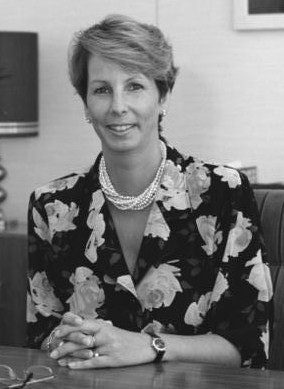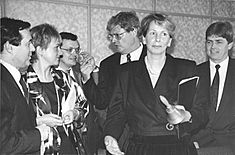Sabine Bergmann-Pohl facts for kids
Quick facts for kids
Sabine Bergmann-Pohl
Bundesministerin a. D.
|
|||||||||||||||||||||
|---|---|---|---|---|---|---|---|---|---|---|---|---|---|---|---|---|---|---|---|---|---|

Bergmann-Pohl in 1990
|
|||||||||||||||||||||
| Head of state of East Germany | |||||||||||||||||||||
|
Interim
|
|||||||||||||||||||||
| In office 5 April 1990 – 2 October 1990 |
|||||||||||||||||||||
| Minister-President | Hans Modrow Lothar de Maizière |
||||||||||||||||||||
| Preceded by | Manfred Gerlach (as Chairman of the State Council) | ||||||||||||||||||||
| Succeeded by | Richard von Weizsäcker (as President of Germany) | ||||||||||||||||||||
| President of the Volkskammer | |||||||||||||||||||||
| In office 5 April 1990 – 2 October 1990 |
|||||||||||||||||||||
| Deputy |
See list
Reinhard Höppner
Käte Niederkirchner Stefan Gottschall Jürgen Schmieder Wolfgang Ullmann Dieter Helm |
||||||||||||||||||||
| Preceded by | Günther Maleuda | ||||||||||||||||||||
| Succeeded by | Rita Süssmuth (as President of the Bundestag) | ||||||||||||||||||||
| Minister for Special Affairs | |||||||||||||||||||||
| In office 3 October 1990 – 18 January 1991 Serving with Rudolf Seiters, Hans Klein, Günther Krause, Lothar de Maizière, Rainer Ortleb, Hansjoachim Walther
|
|||||||||||||||||||||
| Chancellor | Helmut Kohl | ||||||||||||||||||||
| Preceded by | Position established | ||||||||||||||||||||
| Succeeded by | Position abolished | ||||||||||||||||||||
| Parliamentary State Secretary in the Ministry of Health |
|||||||||||||||||||||
| In office 18 January 1991 – 26 October 1998 |
|||||||||||||||||||||
| Chancellor | Helmut Kohl | ||||||||||||||||||||
| Minister | Gerda Hasselfeldt Horst Seehofer |
||||||||||||||||||||
| Preceded by | Anton Pfeifer | ||||||||||||||||||||
| Succeeded by | Christa Nickels | ||||||||||||||||||||
|
|||||||||||||||||||||
| Personal details | |||||||||||||||||||||
| Born |
Sabine Schulz
20 April 1946 Eisenach, Thuringia, Soviet occupation zone, Allied-occupied Germany (now Germany) |
||||||||||||||||||||
| Political party | Christian Democratic Union (1990–) | ||||||||||||||||||||
| Other political affiliations |
Christian Democratic Union (East) (1981–1990) | ||||||||||||||||||||
| Spouses |
Ulrich Pohl
(m. 1972–1979)Jürgen Bergmann
(m. 1990) |
||||||||||||||||||||
| Children | 2 | ||||||||||||||||||||
| Residence | Berlin | ||||||||||||||||||||
| Alma mater | Humboldt University of Berlin (Dr. med.) | ||||||||||||||||||||
| Occupation |
|
||||||||||||||||||||
Sabine Bergmann-Pohl (born Sabine Schulz on April 20, 1946) is a German doctor and politician. She is famous for being the last leader of East Germany before it reunited with West Germany.
As a member of the Christian Democratic Union of Germany (CDU) political party, she was the President of the Volkskammer (the East German parliament) from April to October 1990. During this time, she also acted as the temporary head of state. This made her the youngest, the only woman, and the final person to lead East Germany.
After the reunification of Germany, she continued to work in the government. She served as a minister and later as a state secretary in the Ministry of Health under Chancellor Helmut Kohl.
Contents
Early Life and Medical Career
Sabine Bergmann-Pohl was born in Eisenach, a town in the German state of Thuringia. After finishing school in 1964, she worked for two years at a medical institute at Humboldt University in East Berlin.
In 1966, she began studying medicine and became a doctor in 1972. She specialized in treating diseases of the lungs. In 1980, she earned her medical doctorate degree. For the next ten years, she worked as a medical director at clinics in East Berlin that focused on lung diseases and tuberculosis.
Besides her work in medicine and politics, Bergmann-Pohl has also been active in charity work. Since 2003, she has been the President of the Berlin Red Cross.
A Career in Politics
In 1981, Bergmann-Pohl joined the East German branch of the Christian Democratic Union (CDU). At the time, East Germany was a communist state, and the CDU was a smaller party that was controlled by the main ruling party.
Leading East Germany Through Change
In March 1990, East Germany held its first and only free and fair election. Bergmann-Pohl was elected to the country's parliament, called the Volkskammer. On April 5, the parliament chose her as its president.
On the same day, the parliament got rid of the State Council, which had been the collective head of state. According to the constitution, the president of the parliament was also the vice president of the country. This meant that Bergmann-Pohl became the temporary head of state of East Germany.
She led the country during a very important time. On August 23, 1990, she oversaw the parliament's official request to join West Germany. A few weeks later, on September 12, the parliament approved the unification treaty, which finalized the plan for the two Germanys to become one country again.
Role in Reunified Germany
When German reunification happened on October 3, 1990, Bergmann-Pohl became a member of the Bundestag, the parliament of the newly united Germany. She and other leaders from the last East German government were given special roles in Chancellor Helmut Kohl's cabinet to help with the transition.
After the all-German election in 1990, she was appointed as a top official in the Federal Ministry for Health. She held this position until 1998. She remained a member of the Bundestag until 2002.
Personal Life
Sabine Bergmann-Pohl was married to Ulrich Pohl from 1972 to 1979, and they had two children. She has been married to Jürgen Bergmann since 1990. She is a Protestant.
Summary of Political Offices
- Member of the People's Chamber (East German Parliament) (1990)
- President of the People's Chamber (1990)
- Member of the German Bundestag (German Parliament) (1990–2002)
- Federal Minister for Special Affairs (1990–1991)
- Parliamentary State Secretary in the Ministry of Health (1991–1998)
Books and Publications
- Farewell without Tears. Looking back at the Year of the Unification. (1991)
- Panel Discussion 1953-1989: Germany on the way to unity and freedom (2004, co-editor)
- "The cry for freedom." The Hungarian Revolution of 1956 (2007, co-editor)
See also
 In Spanish: Sabine Bergmann-Pohl para niños
In Spanish: Sabine Bergmann-Pohl para niños


